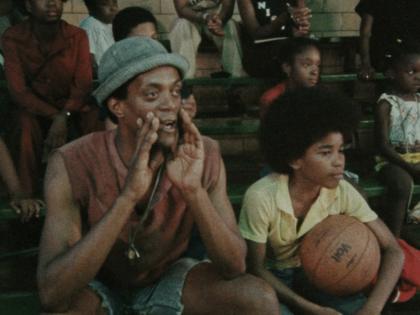The 2025 Black Harvest Film Fest spotlights a pair of hard-to-find restorations
Published in Entertainment News
CHICAGO — The media image of the American farmer rarely reflects the existence of Black farmers, who take center stage in the documentary “Seeds,” which is on the schedule of this year’s Black Harvest Film Festival, coming to the Siskel Film Center.
Originally premiering at the Sundance Film Festival earlier this year, “Seeds” will screen twice (Nov. 8 and 10) and it comes from director Brittany Shyne, who captures the everyday life of Black farmers across the American South, spotlighting older folks in particular. Shot in black-and-white, Shyne was her own director and cinematographer, which likely created a sense of intimacy with her subjects. This comes through in the opening moments that capture the overlapping conversations of a family after a funeral. Everyone piles into a car and ignores the camera, which is perhaps why there’s no self-consciousness. Their exchanges are mundane and filled with sentence fragments, of everyone lost in their own thoughts. This is how families talk, how this family talks. Filled with vignettes that lack tidy endings, the film’s deliberate pacing and abstract collage-like format demand patience from the viewer.
Now in its 31st year at the Siskel, Black Harvest was founded by Sergio Mims, who died in 2022. Since then, the festival’s curator has been jada-amina (her name is uncapitalized). A significant change under her tenure has been shortening the fest from a monthlong run to two weeks. But instead of just one of the Siskel’s two theaters featuring festival programming — as had been the case previously, with the other screen given over to films unrelated to the fest — now both are dedicated to Black Harvest during its entire run.
“The Siskel’s demographics year-round don’t look like the demographics that come out during the festival,” said jada-amina. “I’m all about potency and the energy felt kind of split in a way that speaks to a long history of divisiveness. So the idea was: What would it look like to position Black Harvest as our programming for a set amount of time on both screens?”
This sets the stage for a different dynamic even in the lobby itself, creating a sense of occasion and shared anticipation, which festivals need.
The festival is primarily devoted to various shorts programs, including one focused on stories about Chicago’s South Side (Nov. 8), another focused on the history of Black women artists and organizers in Chicago (Nov. 15) and a collection of horror shorts (Nov. 9 and 12), among several others.
While most film festivals tend to be oriented around newer films, this year’s Black Harvest features restorations of two films that are decades old, not available to stream and otherwise difficult to find.
The 1981 indie “Will” (Nov. 8 and 12) comes from director Jessie Maple and is one of the first feature films directed by a Black American woman. Set in Harlem, it stars Obaka Adedunyo as a former basketball phenom struggling to free himself from a heroin addiction while inadvertently becoming a mentor of sorts to a young boy in the neighborhood (Robert Dean). The film is also an early role for Loretta Devine.
Maple, who died in 2023, has a fascinating backstory. In the early 1970s, she began working as a cameraperson for local TV news and was the first Black woman admitted to the New York camera operators union. But she had to fight for opportunities and couldn’t initially get hired. So: “I sued them all at once, ABC, CBS, NBC, and I won,” she said during a 2020 appearance in Chicago.
In the nonfiction book “Shooting Women: Behind the Camera, Around the World,” the authors interview camerawomen, including Maple, who talks about learning to film in such a way so that “they couldn’t cut the Black person out.”
The festival’s closing night film is 1972’s “Black Girl” (Nov. 16). Directed by Ossie Davis, it was also recently restored, but it was just serendipity that one of jada-amina’s colleagues mentioned its availability, not knowing she was well-versed in it.
“I went to film school and got really, really into finding these films that were out of distribution, Black films in particular. They’re not even streaming. And I think maybe I found a link to this film from a Black cinephile that had been uploaded to someone’s Google Drive. And I was like, people need to see this. But how? I could show my friends — and I did, privately — but now it can be seen on the big screen.”
Davis, who died in 2005, was perhaps better known as an actor (and husband to fellow actor Ruby Dee, who is also in the film). Adapted from the 1969 play by J.E. Franklin, it is the story of a high school senior looking for a different life trajectory than that of her older sisters, who are married with kids, and this creates all kinds of friction within the family.
This will be the Chicago premiere for “Black Girl,” the 4K restoration. Showing older films alongside newer ones creates a through line in terms of awareness of the history of Black cinema.
“The festival is put together in the spirit of: What would make you get off your phone and come and see these movies?” says jada-amina.
———
The Black Harvest Film Festival runs Nov. 7-16 at the Siskel Film Center, 164 N. State St. For more information, go to siskelfilmcenter.org.
———
©2025 Chicago Tribune. Visit chicagotribune.com. Distributed by Tribune Content Agency, LLC.













Comments